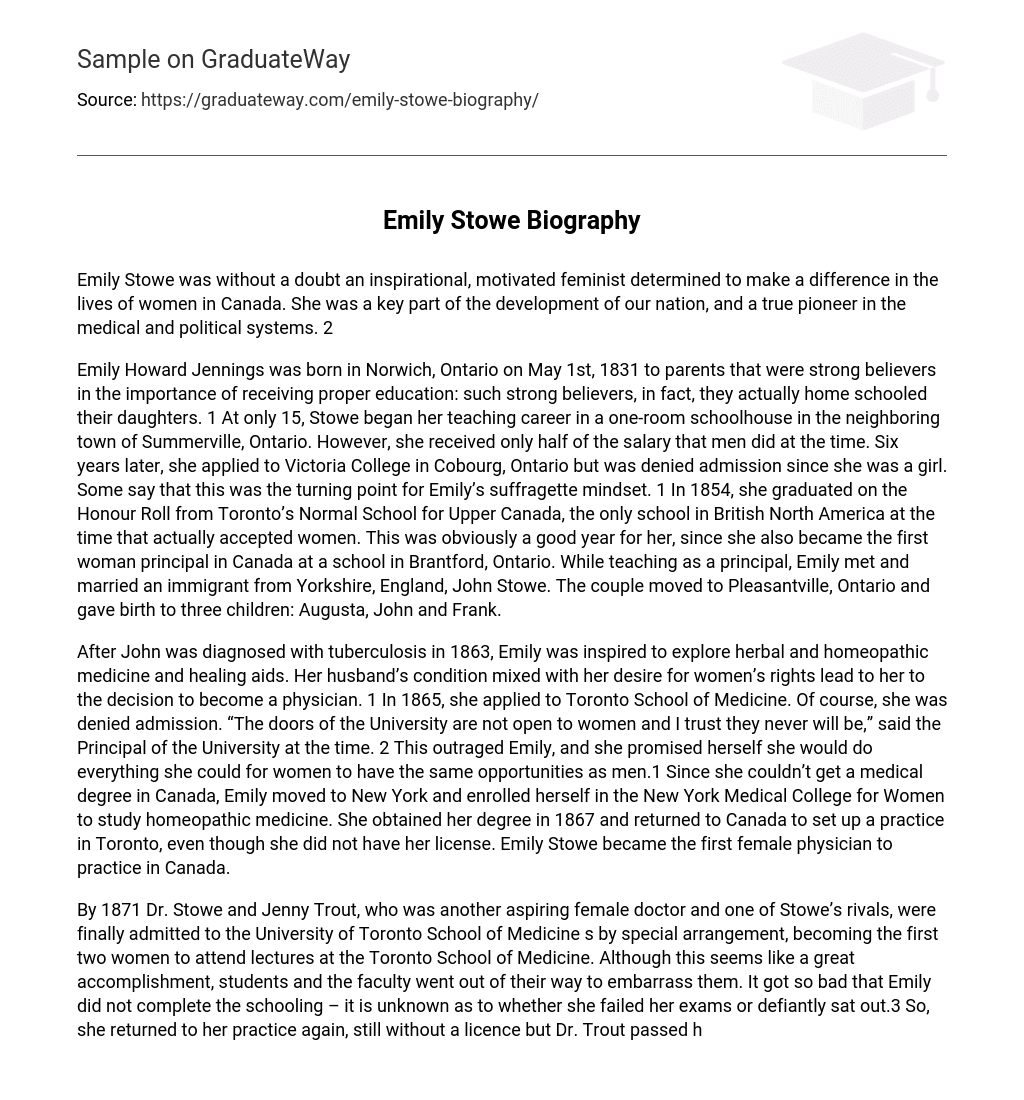Emily Stowe was a determined advocate of women’s rights and worked tirelessly to enact positive transformations in the lives of Canadian women. Her contributions were instrumental in shaping the nation, as she broke new ground in both medical and political fields.
Emily Howard Jennings was born in Norwich, Ontario on May 1st, 1831 to parents who valued education and chose to homeschool their daughters. At the age of 15, Emily began her teaching career at a one-room schoolhouse in Summerville, Ontario. However, she faced gender discrimination and received only half the salary that her male colleagues earned. Despite this setback, Emily’s determination was fueled when she was denied admission to Victoria College in Cobourg, Ontario solely because of her gender. This experience played a significant role in shaping her beliefs as a suffragette.
In 1854, Emily successfully graduated with honors from Toronto’s Normal School for Upper Canada – the only educational institution in British North America at that time that accepted women. The same year also marked her appointment as Canada’s first female principal at a school in Brantford, Ontario. It was during her tenure as principal there that Emily met and married John Stowe, an immigrant from Yorkshire, England.
The couple eventually settled down in Pleasantville, Ontario and had three children together: Augusta, John and Frank.
After being diagnosed with tuberculosis in 1863, John’s illness led Emily to explore herbal and homeopathic medicine and healing aids. This, along with her passion for women’s rights, motivated her to pursue a career in medicine. In 1865, she applied to the Toronto School of Medicine but was rejected because the Principal believed that women should not be accepted into the University. This rejection angered Emily and strengthened her resolve to advocate for equal opportunities for women. Unable to obtain a medical degree in Canada, she moved to New York and joined the New York Medical College for Women to study homeopathic medicine. Despite not having a license, Emily earned her degree in 1867 and returned to Toronto to establish her own practice. As a result, she became Canada’s first female physician.
In 1871, the University of Toronto School of Medicine broke ground by admitting Dr. Stowe and Jenny Trout, both aspiring female doctors, under a special arrangement. This marked the first time women were allowed to attend lectures at the school. However, despite this significant milestone, they endured deliberate humiliation from their peers and professors. The situation became unbearable for Emily, prompting her to halt her education prematurely. It remains unclear whether she failed her exams or defiantly chose to withdraw from the program. Nonetheless, she continued practicing medicine without a license. In contrast, Dr. Trout successfully passed her exams and went on to become Canada’s first licensed female physician.
Emily’s dedication to advocating for acceptance and rights in the political and medical communities motivated her to fight even harder for Canadian women. In 1877, she co-founded the Toronto Women’s Literary Guild, which later evolved into the Canadian Women’s Suffragette Association, Canada’s first suffragette group. These efforts resulted in increased educational opportunities for women in Toronto. During this time, Emily continued her education and suffragette activism while her husband recovered from tuberculosis and pursued dental training.
Despite facing challenges, Emily persisted with her medical practice focusing on women’s and children’s health. However, in 1879, she faced charges related to performing an abortion on one of her patients. This incident led to an investigation into the death of a pregnant woman who had taken medicine prescribed by Dr. Stowe. After enduring a lengthy trial that was often intimidating, the charges were eventually dismissed.
Less than a year later, in 1880, Dr. Stowe obtained her medical license from the College of Physicians and Surgeons of Ontario, becoming only the second licensed female physician in Canada.
Dr. Stowe was instrumental in breaking down barriers for future generations of women in medicine and advocating for women’s education. She tirelessly fought to change the University of Toronto’s policy, resulting in her daughter Augusta becoming the first woman to graduate from a Canadian medical school in 1883. This achievement sparked the formation of the Ontario Medical College for Women, which originated from discussions at a public meeting of the Toronto Women’s Suffrage Association during that same year.
In 1888, Dr. Stowe attended a suffragette conference in Washington, D.C., where she gained valuable information to reinvigorate the women’s rights movement in Canada upon her return. The following year, she co-founded the Dominion Women’s Enfranchisement Association and served as its inaugural president until her death.
During this time, the Women’s Christian Temperance Union petitioned the Ontario Legislature to grant voting rights to widows and spinsters. Dr. Stowe ardently supported this request, highlighting that educated and morally-driven women should have a direct influence on our nation and its progress.
Although the women faced disrespect from legislators, they sparked further debate. In 1891, Emily’s husband John Stowe passed away. Despite a severe fall at the Women’s Congress in the 1893 Chicago World’s Fair, which potentially ended her medical career, Emily remained involved in the Toronto Mock Parliament of 1896. She humorously portrayed the role of Attorney-General, delivering a speech that recommended denying men’s petition to vote while advocating for women’s voting rights. In 1903, Dr. Emily Stowe passed away in Toronto, but her legacy lived on. Over five decades later, women in Canada finally gained the right to vote and much recognition is owed to Stowe. Her daughter Augusta carried on the legacy as both a Canadian female physician and suffragist, clearly inspired by her determined mother. Dr. Emily Howard Jennings Stowe made an incredible contribution to Canadian women’s history and will be forever remembered as an exceptional teacher, physician, and passionate suffragist.





